Here at Meeple Mountain, our love affair with Vital Lacerda games is well documented. Our team conducted an interview with the designer a few years ago and I wrote a review of On Mars (my favorite Lacerda game) in early 2021. However, we did not have a review of the 2016 release Vinhos Deluxe Edition—itself a re-release of 2010’s Vinhos—and I had to fix that right away!
In the realm of Lacerda designs, Vinhos Deluxe Edition is on the lighter end, especially if you prefer using the 2016 “Special Vintage” version of the game. And even though many of you may prefer Viticulture: Essential Edition over Vinhos Deluxe Edition for your wine game needs, I think there’s room for both in your collection.
A note about this article: some people prefer the 2010 version of Vinhos. I do not prefer that version and I’ll highlight the reasons for that below. Everything you’ll see in this article, then, explains my love affair with the 2016 “Special Vintage” edition, so any rules discussions align with that version only.
And with that, grab a glass of wine and let’s talk about Vinhos Deluxe Edition!
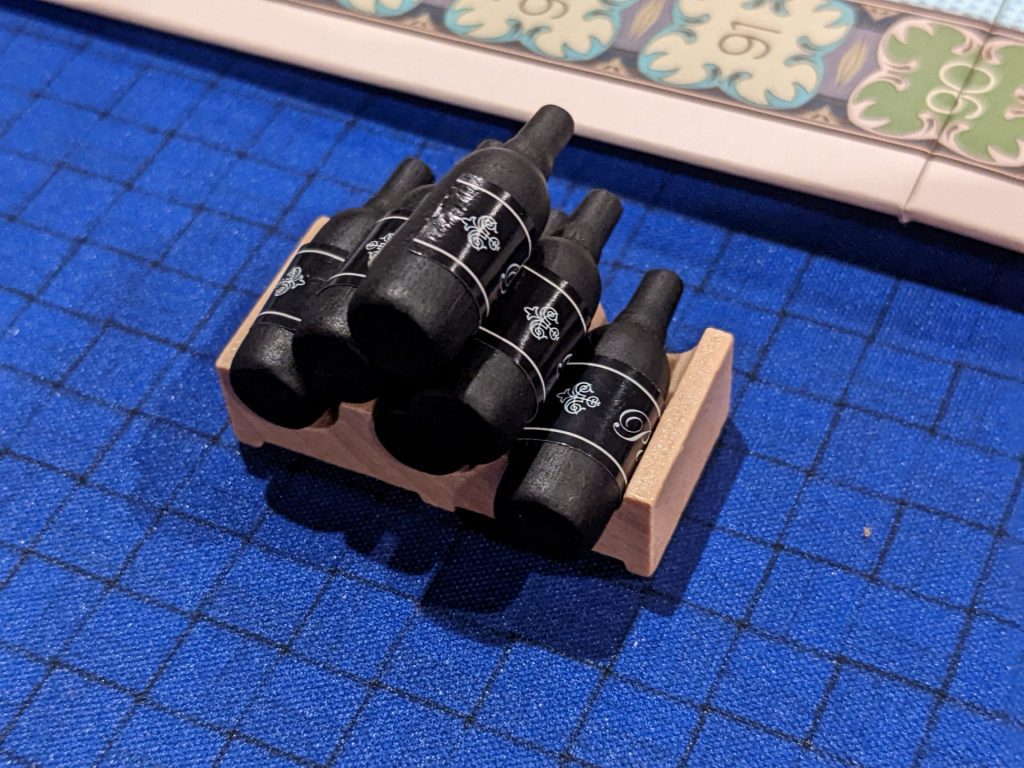
The Business of Wine
Vinhos Deluxe Edition puts you in the shoes of a person who inhabits the world of wine. Over the course of 13 turns, your job is to produce wine and sell it to local establishments for cash and export it to other regions for points. At 3 distinct points during the game, you’ll send your wine to a fair to be judged, and these fairs build prestige for your estates over time to generate more wealth and more points.
Along the way, you’ll need to visit new regions to expand your wine production, hire farmers to tend the land, hire enologists to staff your wineries and hire wine experts to help at the fair. Vinhos Deluxe Edition does a fabulous job of streamlining these efforts by focusing on what really matters: money.
You’ll start the game by placing a vineyard into one of your 5 estates. Vinhos Deluxe Edition doesn’t get caught up in the specifics of what kinds of wine you are making; words like pinot noir and chardonnay never appear in Vinhos Deluxe Edition. Instead, are you making white wine or red? Many of the starting vineyard placements score an immediate bonus: increased storage, in the form of a wine cellar, or a winery where customers can taste wine when they visit the estate.
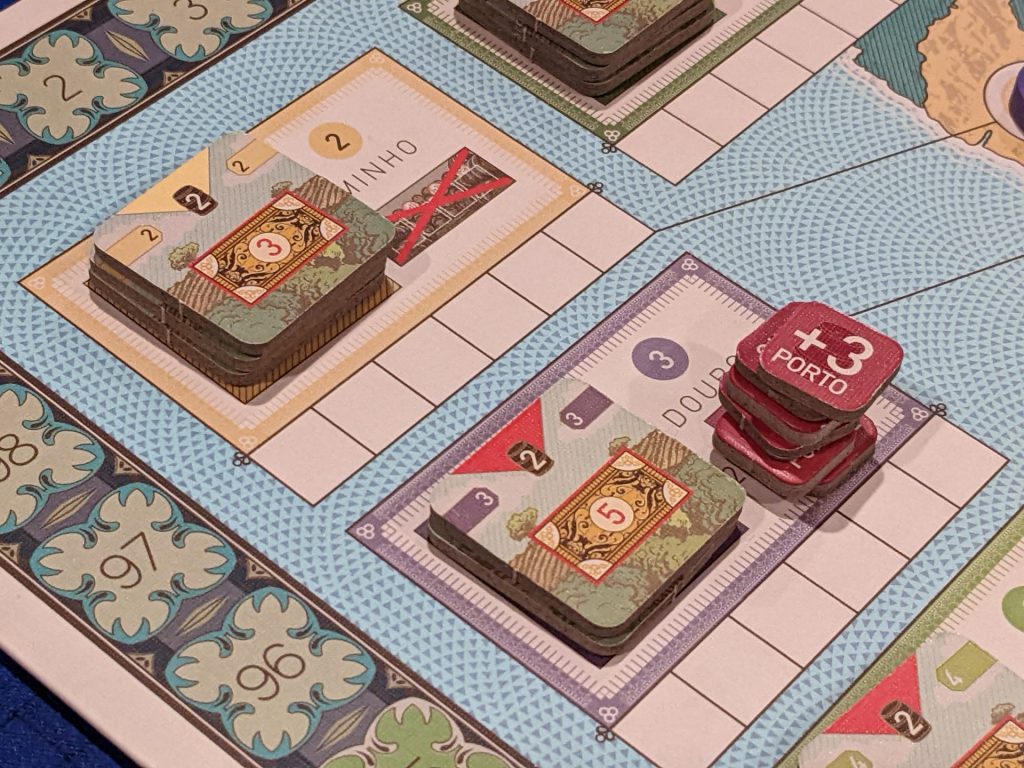
You have a short amount of time to make wine magic, but the 13 turns (2 per year for 6 years, then one bonus action for all players) all feature such a rich decision space. Enologists will help with wine quality each time wine is produced. Sometimes, you’ll want to visit a different space to hire wine experts, who come in very handy when you need to navigate the needs of the 3 wine judges at that year’s fair. Impressing those judges allows you to expand production, for both selling wine to local hotels and restaurants but also for shipping overseas.
Dictating which action space you can visit each turn is a 3×3 grid where your single worker can go. And, just like other Lacerda games, Vinhos Deluxe Edition penalizes you for going where other pawns reside. In Escape Plan, your Notoriety goes up when you visit a location with other criminals. In The Gallerist, you give another player the chance at a “follow” action. In Vinhos Deluxe Edition, you give other players what they crave most. (You guessed it: money!)
But this also spurs creativity; if Andrew is at the cellars action space, and David is selling wine, I need to go elsewhere. What else can I do to strengthen the engine right now? And can I use any of my bonus actions to get around the spaces I need being blocked?
Bonus actions, you say?
Yes! Vinhos Deluxe Edition has Magnate tiles. You’ll get one of these to start the game; a very minor discount on an action, or another way to take an action from the grid if one is blocked. These Magnate tiles are flipped when used but refresh at the end of each wine fair. But you can get more Magnate action tiles by dumping some of your less-than-marketable wine tiles, giving you the chance to do 2 actions in a turn a few times before the game ends.
Action efficiency feels good right? Later in the game, the market of Magnate tiles turns into Multiplier tiles, used for end-game scoring opportunities. It gives players lots of reasons to keep the production engine humming all the way through the end of the game.
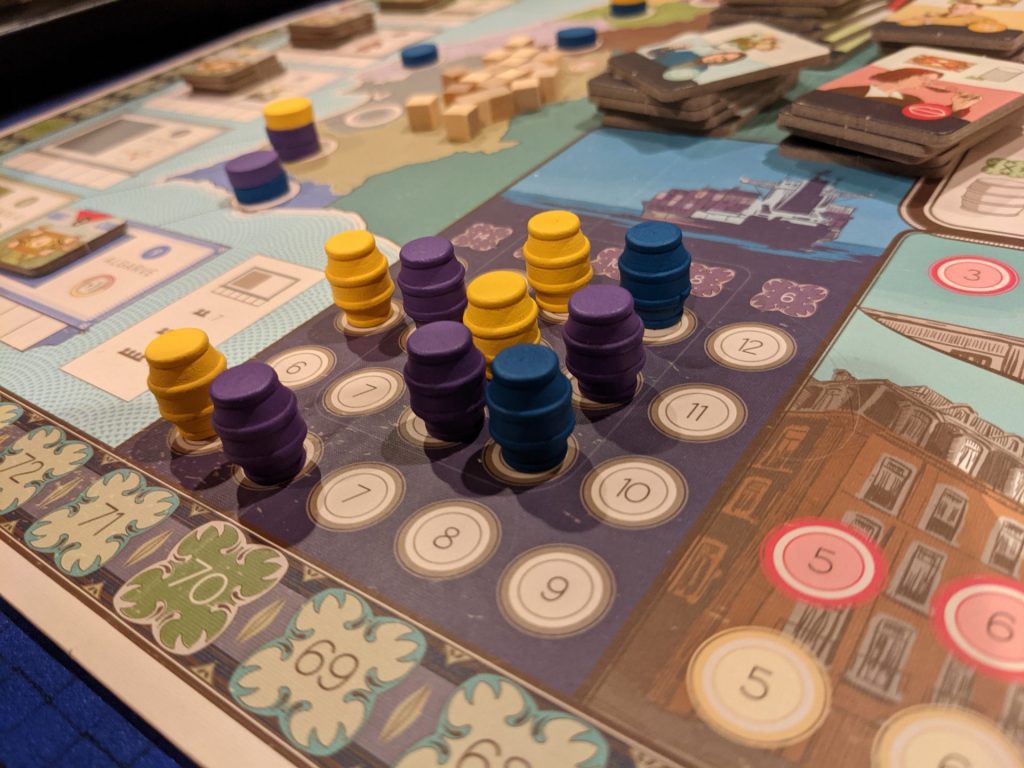
Deluxe, Indeed
Vinhos Deluxe Edition is a hell of a box. Like other Eagle-Gryphon Games productions, Vinhos Deluxe Edition is just a beautiful game to unpack and put on the table. Whenever a friend suggests they want to play it, I get excited just for the chance to take Vinhos Deluxe Edition off the shelf and start laying out the components.
Those player boards? Excellent and thick. I love putting the farmers, enologists, cellars and wineries in their respective places on the boards. Standing up the barrels in the judges area, laying out the vineyards in each region, and stacking up the wine experts is a joy. The chunky cardboard bagos (money) pieces are great too, even though I normally substitute them out for my Iron Clays because I prefer poker chips for almost every game that features money.
The whole thing just feels luxurious, magnificent even, to put on the table. It’s the opposite of the feeling I had when I broke out a copy of the base game of Terraforming Mars and put that on the table. The gameplay in Terraforming Mars is excellent but it’s a shabby production. In that game, the player boards are sheets of paper, the tiles are only serviceable, and the card art is, well, regrettable.
Vinhos Deluxe Edition doesn’t have these problems. New players often take one look at the table with a 4-player setup of Vinhos Deluxe Edition and blurt out “wow.” I regularly balk at spending more than $75 for a game, but Vinhos Deluxe Edition feels like it is worth the price when you balance the excellent production with such depth in gameplay.
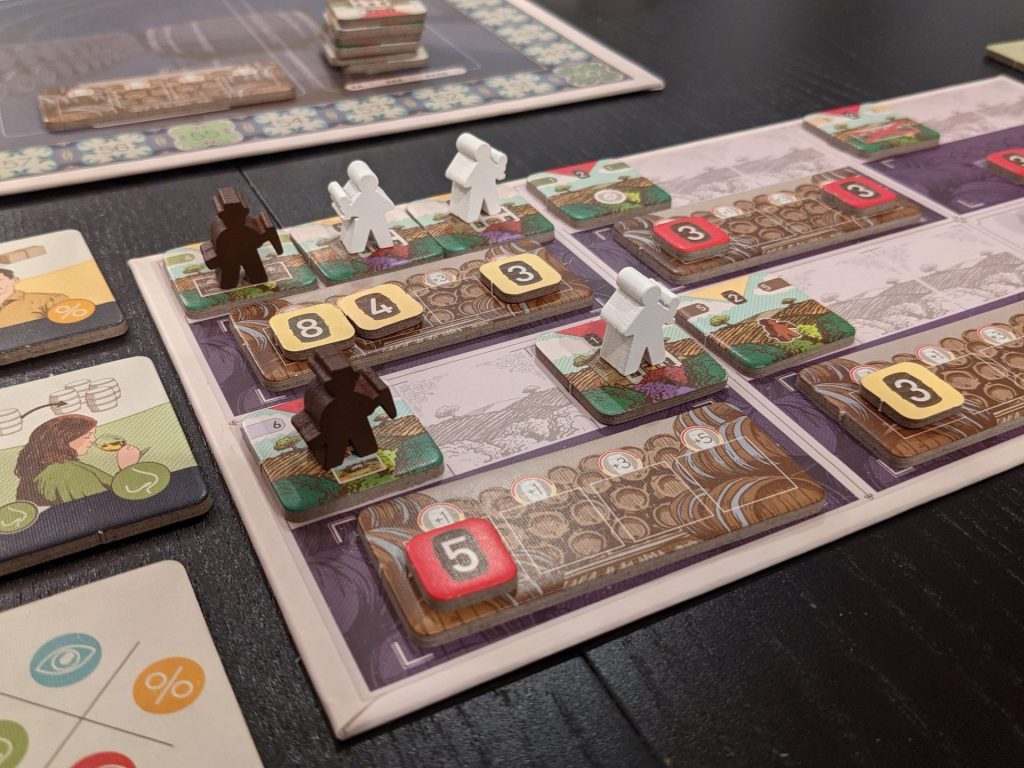
So, Let’s Talk About the 2010 Version
I don’t like it.
As much as I love the production elements for both games, 2010’s rules are what triggered Lacerda and EGG to release the 2016 version of the game. And I’m fairly confident it is for one reason, and one reason only:
The bank action.
In the 2010 version of Vinhos, one of the 9 action spaces is the Bank. Whenever you use the Sell Wine action to earn money from local establishments, you aren’t paid right away. Instead, it’s like the local hotel sends payment in the form of a check to your local bank, and then you have to take an extra freakin’ turn to get that money to spend on other actions.
Thematic? No. You are telling me that in the modern commerce space, I am getting paid by a vendor but I have to go to the bank to take out cash? No, sir! When’s the last time YOU walked into a bank? (I think I went to a bank about 20 years ago to get a roll of quarters so that I could pay parking meters whenever I drove downtown. Nowadays, the term “meter maid” is thankfully a thing of the past, for a lot of reasons!)
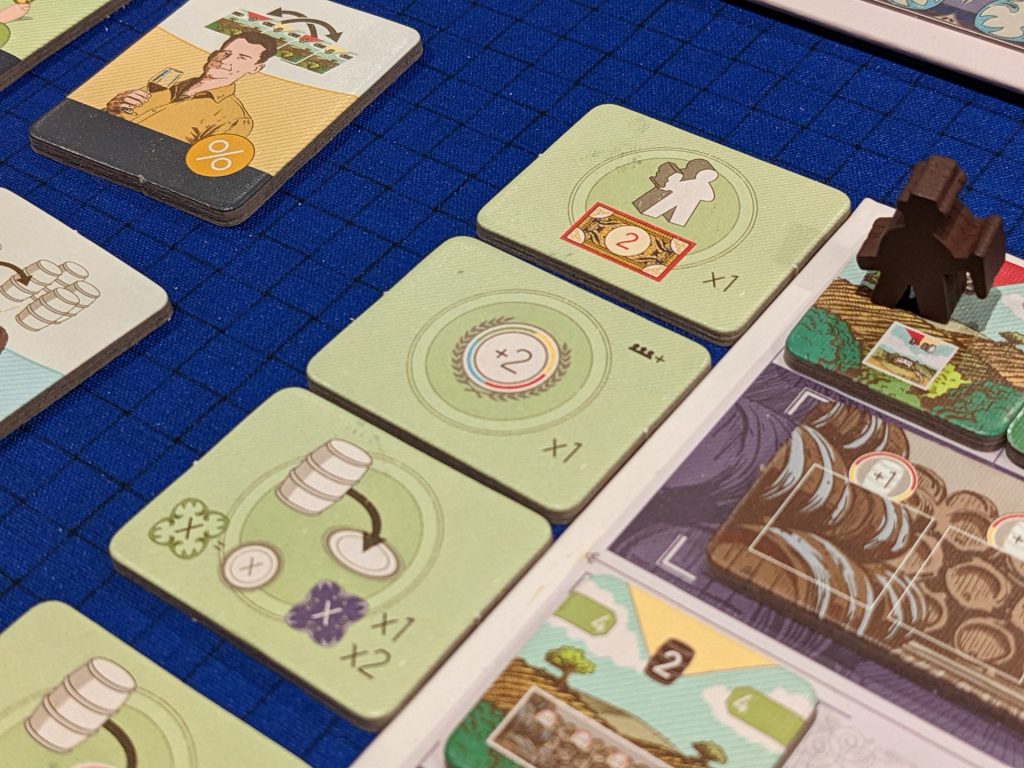
I played the 2010 version of Vinhos a single time, saw this rule, and swore I would never play that version again. To be fair, I have plenty of friends who enjoy the complexity this step adds to the strategic elements of the game. I just think that makes the game intentionally harder without the payoff.
The 2016 version of Vinhos Deluxe Edition changes one other aspect of the game: the wine fair.
In the 2010 version, your fair points reset at the end of each fair, which gives players an equal chance every round to move ahead and win that round’s fair. I like the thematic change in the 2016 version to make fair points cumulative across all 3 fairs, especially the idea that an estate making good wine in previous years might do so again in the future, giving that player a slight advantage. I’ve seen players win the first fair then lose the next 2 fairs, and there are plenty of ways to enter a fabulous wine into late-game fairs to overtake a player who has the lead in fair points.
The change in rules at the wine fair is not a major one. The bank space, though, is not missed when I go through my plays of the 2016 version.
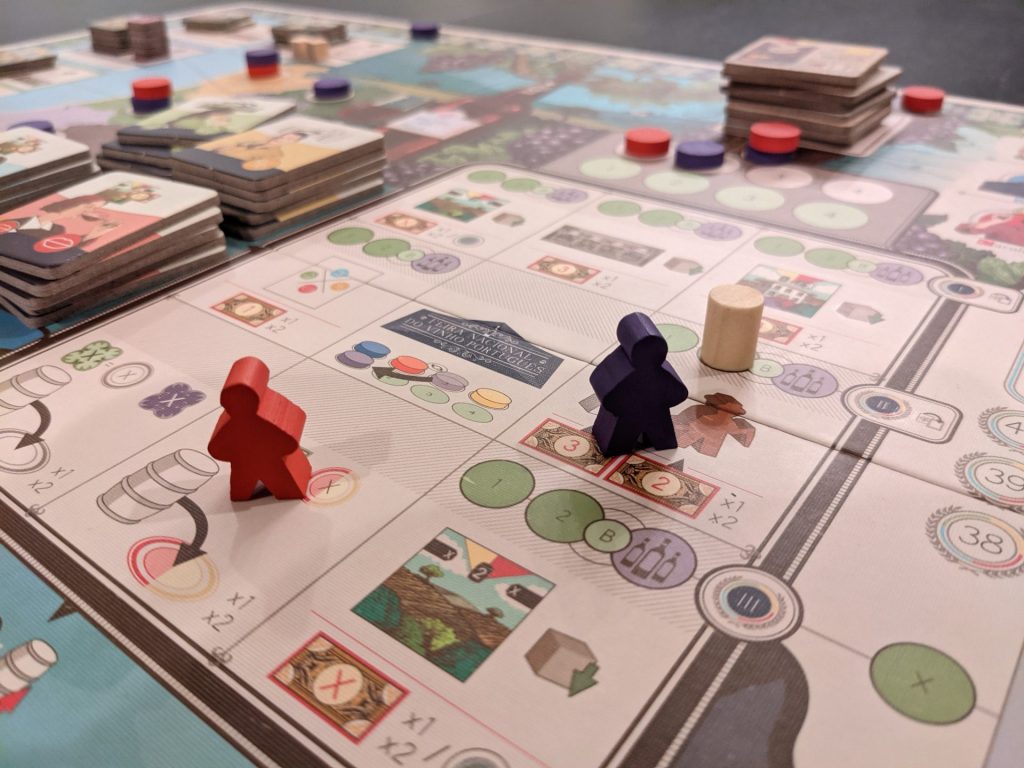
Export Some Wine!
Vinhos Deluxe Edition is a really slick, elegant game. It’s a midweight game that can be taught in 20 minutes, with interesting decisions right out of the gate. Money is tight, but not Pipeline-tight: a harsh reminder of my experience out of college living paycheck to paycheck, barely scraping by. Vinhos Deluxe Edition feels incredibly thematic but the game-y elements, like the importance of area majorities on the export tracks, don’t distract from the experience.
Player counts scale nicely and while I enjoy a good knife fight in games at the full player count, Vinhos Deluxe Edition is excellent at 2 and 3 players as well. My wife and I can knock out a game of Vinhos Deluxe Edition in just under an hour and it’s the best experience in history to feature the business of wine while drinking wine.
And Vinhos Deluxe Edition even has a tiebreaker that I love, because it ties thematically in what you are trying to do during the game. Such a great experience!


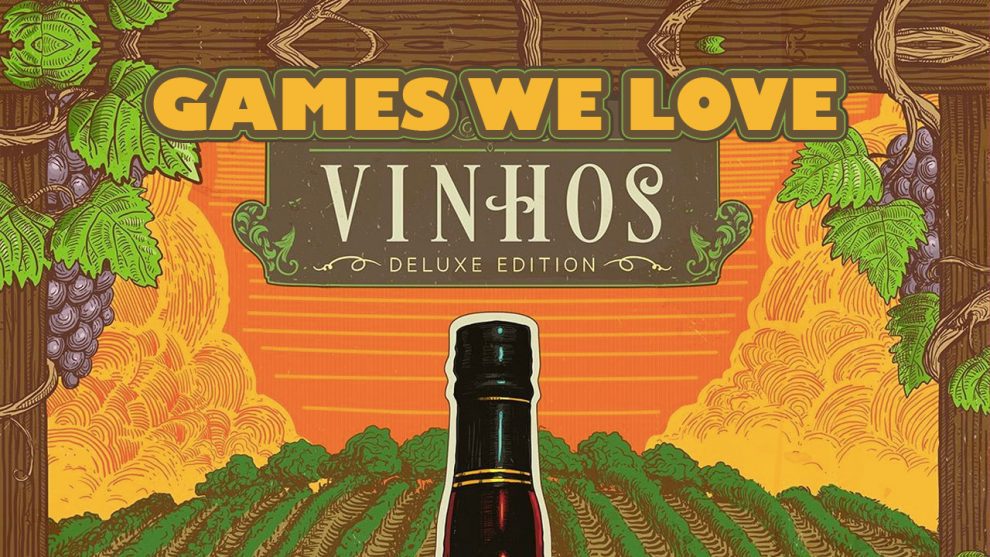


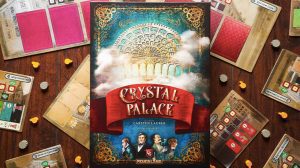






Add Comment